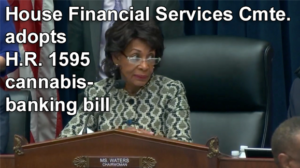March 29, 2019 NASCUS Report
Posted March 29, 2019Panel sends cannabis legislation to House floor
Legislation intended to clarify that credit unions and other financial institutions may provide banking services to legal cannabis-related businesses was passed by a House panel Thursday on an overwhelming, bipartisan vote; the bill now heads to the floor for consideration.
Significantly, it’s the first time that such legislation has reached this stage of the lawmaking process. NASCUS has long supported (for at least five years) for legislative clarification.
The Secure and Fair Enforcement Banking Act (The SAFE Banking Act, H.R. 1595) passed the House Financial Services Committee on a vote of 45-15, with votes from both sides of the aisle in support.
(Click on the image to see the committee’s final vote on H.R. 1595)
As drafted, the legislation would give legal cannabis-related businesses access to financial institution services and exempt financial institutions and employees from federal prosecution (or investigation) solely for providing services to state-authorized cannabis-related businesses.
It would bar federal financial institution regulators from taking several actions against credit unions and banks serving legal cannabis-related businesses, including:
- Terminating or limiting deposit insurance at a bank or credit union “solely because the depository institution provides or has provided financial services to a cannabis-related legitimate business”;
- Prohibiting, penalizing, or discouraging a bank or credit union from providing financial services to (first) a cannabis-related legitimate business or (second) to a state (and its political subdivisions or Indian Tribe) that exercises jurisdiction over cannabis-related legitimate businesses;
- Encouraging (in any way) a bank or credit union not to offer or to downgrade financial services to account holders solely because they own or become an owner of a cannabis-related legitimate business;
- Taking any “adverse or corrective supervisory action on a loan made to an owner or operator” of a cannabis-related legitimate business or for real estate or equipment leased to that business.
The legislation received strong support from trade groups in both the credit union and banking industries. NASCUS, which also supports the bill, has been outspoken since 2014 in its call for legislation that clarifies the permissibility of financial institutions providing financial services to state-authorized cannabis businesses. (However, NASCUS, and the other groups, have made it clear they take no position on legalization of cannabis usage.)
NASCUS’ Ito: A first step in resolving a long-time conflict
Following adoption of H.R. 1595, NASCUS and CEO President Lucy issued a press statement commending the committee, and expressing the need for clarity for credit unions and other financial institutions serving legal cannabis-related businesses.
“Thursday’s vote is the first step in resolving the conflict between state and federal law regarding service to legal state cannabis businesses and related businesses,” Ito said “After years of uncertainty, credit unions and the agencies that regulate them are anxious for clarity. We continue to call on the full House – and ultimately the Senate — to promptly pass this legislation and end the current regulatory limbo.”
State regulators gather for three-day conference
State credit union supervisors from around the country gather in the Washington area next week to take a close look at key issues, discuss common challenges, and exchange ideas in a NASCUS-sponsored event.
The 2019 NASCUS National Meeting of state regulators (open to regulators only) gets under way Monday at the Gaylord National Resort and Convention Center in National Harbor, Md. The event runs through Wednesday.
Among the key issues to be discussed by the more than 60 regulators gathered from up to 40 states are:
- The new General Data Protection Regulation(GDPR);
- NCUA’s new examination platform, the Modern Examination and Risk Identification Tool (MERIT);
- Cannabis banking policy;
- History of unrelated business income tax (UBIT) issues;
- Cybersecurity;
- Artificial intelligence;
- Trends in financial services.
State regulators also plan to hold a dialogue session with their federal regulator colleagues at NCUA during the conference.
PACE financing proposal summarized
The Property Assessed Clean Energy (PACE) financing proposal issued March 8 by the CFPB is outlined in a summary by NASCUS, available now on the association’s website. The proposal — mandated by the May 2018 Economic Growth, Regulatory Relief and Consumer Protection Act (EGRRCPA, S. 2155) – affects financing to cover the costs of home improvements that results in a tax assessment on the real property of the consumer.
CFPB has noted that the proposed rule must achieve two goals under the regulatory relief law: First, carry out the purposes of the Truth in Lending Act’s (TILA) ability-to-repay (ATR) requirements (now in place for residential mortgage loans) with respect to PACE financing. Second, apply TILA’s general civil liability provision for violations of the ability-to-repay (ATR) requirements the bureau will prescribe for PACE financing.
“The regulations must ‘account for the unique nature’ of PACE financing,” the filing stated. “This ANPR solicits information to better understand the PACE financing market and the unique nature of PACE financing.”
The NASCUS summary neatly lays out the information that the bureau is seeking in the ANPR from commenters, including:
- Written materials associated with PACE financing transactions such as samples of any written materials used in PACE financing transactions;
- Descriptions of current standards/practices in the PACE financing origination process;
- Written materials associated with PACE financing transactions such as samples of any written materials used in PACE financing transactions.
- Descriptions of current standards/practices in the PACE financing origination process;
- Information about what features of PACE financing make it unique and how the bureau should address those unique features;
- Views concerning the potential implications of regulating PACE financing under TILA.
Prepaid rule finally takes effect next week
Monday is the effective date of the CFPB’s rule on prepaid accounts, which was finalized in October 2016, but then modified early last year (in January), including with an extension of the effective date to April 1 of this year. The bureau said last year that it extended the effective date in recognition of those affected by the rule who commented that they needed more time to put the rule to work – especially those card issuers who needed to package cards sold in stores.
According to the notice filed by CFPB last year, the central provisions of the final rule:
- Revise the error resolution and limited liability provisions of the Prepaid Accounts Rule in Regulation E to provide that financial institutions are not required to resolve errors or limit consumers’ liability on unverified prepaid accounts. For accounts where the consumer’s identity is later verified, financial institutions are not required to limit liability and resolve errors with regard to disputed transactions that occurred prior to verification.
- Create a limited exception to the credit-related provisions of the Prepaid Accounts Rule in Regulation Z for certain business arrangements between prepaid account issuers and credit card issuers that offer traditional credit card products. This exception is designed to address certain complications in applying the credit provisions of the Prepaid Accounts Rule to credit card accounts linked to digital wallets that can store funds where the credit card accounts are already subject to Regulation Z’s open-end credit card rules in circumstances that appear to pose lower risks to consumers. This final rule also expands the situations in which prepaid account issuers are permitted to run negative balances on prepaid accounts, provided certain conditions are met.
- Extend the overall effective date of the Prepaid Accounts Rule to April 1, 2019.
- Make clarifications or minor adjustments to provisions of the Prepaid Accounts Rule in Regulation E related to an exclusion from the definition of prepaid account, unsolicited issuance of access devices, several aspects of the rule’s pre-acquisition disclosure requirements, and submission of prepaid account agreements to the Bureau.
- Make technical corrections to certain provisions of the Prepaid Accounts Rule in both Regulations E and Z.
LINK: CFPB Finalizes Changes to Prepaid Accounts Rule
NCUA, regulators plan CECL webinar
A webinar is set for April 11 on the new current expected credit loss (CECL) accounting standard that will cover “significant differences” credit unions and other financial institutions should expect once the standard takes full effect. The event is sponsored by NCUA, the federal banking regulators and others. NCUA said this week that the webinar (which starts at 2 p.m.) will focus on how changes in accounting procedures due to the CECL standard (adopted by the Financial Accounting Standards Board, or FASB) will affect smaller institutions. The accounting standard takes full effect in 2022.
A detailed discussion of the weighted average remaining maturity method for estimating the allowance for credit losses will also be included in the webinar, NCUA said, with a question-and-answer period following presentations.
Hosted by the Federal Reserve Bank of St. Louis, the webinar will be presented by staff from NCUA; the federal banking regulators – the Federal Reserve, the FDIC, and the OCC; the Securities and Exchange Commission; state banking regulators (through the Conference of State Bank Supervisors); and FASB.
LINK:
Registration Open for April 11 CECL Webinar
TRANSITIONS: Governor names new WA DFI director
Charlie Clark is the new director of the Washington State Department of Financial Institutions, taking over for Gloria Papiez, who is retiring. Gov. Jay Inslee (D) made the announcement this week. A 14-year veteran of the DFI, Clark was appointed DFI deputy director in 2016. Before that, he served a variety of roles at the agency, including enforcement chief and program manager and director in the Consumer Services division. Before he joined DFI, he served in the office of the state’s Attorney General, where (among other things) he led an attorney team in the government compliance and enforcement division. He received his law degree from University of the Pacific in Sacramento, Calif., as well as a master’s in business administration and a bachelor’s degree from California State University.
LINK:
NASCUS State Regulators
BRIEFLY: On the road in VA
 NASCUS’ Lucy Ito traveled to Richmond this week to visit with Virginia Credit Union League President and CEO Rick Pillow (left) and former California/Nevada Credit Union Leagues leader David Chatfield. The three participated in a session on national and state issues affecting credit unions.
NASCUS’ Lucy Ito traveled to Richmond this week to visit with Virginia Credit Union League President and CEO Rick Pillow (left) and former California/Nevada Credit Union Leagues leader David Chatfield. The three participated in a session on national and state issues affecting credit unions.
For more information about NASCUS's news and/or public relations, please contact our Marketing and Communications Department.
